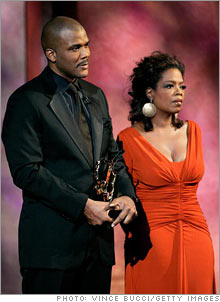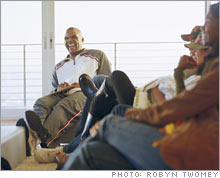(Fortune Magazine) -- Los Angeles is looking fabulous today. It's a November afternoon - bright, clear skies, sparkling ocean - and from this glass mansion in the Hollywood Hills, a flock of seagulls can be seen taking to the air. And the cinematic cliché doesn't end there.
Cut to the interior, and the house is all hard lines and mute colors - abstract art adorns the walls, low chrome tables showcase tall, skinny vases and the modern gray couches are so low that they appear only marginally preferable to the floor for the dozen actors and actresses composing the tableau.
 |
| Perry with Oprah Winfrey at the TNT Black Movie Awards. |
 |
| At home: Perry entertains some of his actors at a brainstorming session. |
Add the sound, though, and everything changes. Tyler Perry, the writer-director-producer-actor-composer who began his career as a playwright, is fielding reactions to the recent table reading of his next film, "Why Did I Get Married?"
Far from an orderly roundtable of notes and nods, the debate among the actors - who range from black Hollywood notables to neophytes handpicked by Perry - is heated, personal, familial. "Marriage is a choice, not a feeling," Tracee Ellis Ross, star of the sitcom "Girlfriends," declares. A male actor - whose identity we'll conceal for his own protection - weighs in: "Cheating is physical, athletic, like dunking."
Perry listens, brow furrowed, his 6-foot-6 frame spilling out of his armchair. He has invited the actors here to talk to him about marriage, but before long they are all looking at him expectantly. "I'm not getting married," he says with a coy smile. "I need someone who can just get in the water and not disturb it too much."
"That's not a woman, honey," Ross retorts. "That's a piece of paper."
The conversation sounds more like a church coffee hour than an L.A. brainstorming session, and it could come straight out of one of Perry's wildly successful dramas.
Perry, 37, is building a maverick media company by translating "urban theater" - the often melodramatic, revival-style stage plays that tour the country catering to black audiences - into mainstream movies and television shows. It's a niche he has come to dominate so thoroughly that he is able to do things in Hollywood that most others - especially newcomers - simply can't.
An impressive résumé
In September, Perry opened Tyler Perry Studios in Atlanta, one of the first movie studios in this country owned by an African American. He made his first two films - 2005's "Diary of a Mad Black Woman" and 2006's "Madea's Family Reunion" - with Lions Gate Entertainment for a total of just $11 million. They both opened at No. 1, and together they grossed over $110 million, shocking Hollywood with their profit margins. His third movie, this month's "Daddy's Little Girls," is opening with similar projections.
Since 1998 his 11 touring stage plays have brought in over $150 million. And DVDs of the movies and plays have sold more than 11 million copies. He even took the top spot on The New York Times nonfiction bestseller list with the publication in 2006 of "Don't Make a Black Woman Take Off Her Earrings: Madea's Uninhibited Commentaries on Love and Life," written in the voice of Madea, the over-the-top grandma he's played in his films and many of his plays.
Remarkably, Perry has retained ownership of all his work. In a business where a cardinal rule is to use other people's money, he has used his own to create a library of substantial and growing value.
But perhaps his most surprising feat has occurred on the small screen. Last fall, in a deal ultimately valued at well over $200 million - and on the strength of a ten-episode test run alone - TBS bought 100 episodes of Perry's new half-hour "sit-dramedy," "House of Payne."
Perry bypassed the entire standard sitcom route - selling a show to a network, running a new episode every week, and hoping to stay on the air long enough to enter syndication, where the real money is - and did it his way. He put up $5 million to do the test episodes, maintained creative control, and, when TBS and others showed interest, made an incredibly lucrative deal that would allow him to have his show on up to five nights a week from the start. In the sitcom world, that's unheard of.
If there were any people left in Hollywood not paying attention to Perry up to that moment, they certainly all are now.
Not all the attention has been favorable. Some in the black community - academics, classically trained actors, the cultural elite - have criticized Perry's work for its representations of black people, calling him everything from moron to minstrel.
Perry knows he courts controversy by employing the conventions of what used to be called the "chitlin' circuit." But he's acutely aware that it's a particular audience - Christian, middle-class, African-American women - who turned him from a starving artist into an entertainment power. It's his ability to deliver that audience that makes him attractive to Lions Gate, TBS and his other partners.
Watching him in this house full of art he probably doesn't even like, in a town preoccupied with image, one can't help but wonder how long he can maintain that precious connection. After years of succeeding in relative obscurity, all but unknown to whites, Tyler Perry is poised to become a mainstream superstar. But will gaining white America's acceptance actually make - or break - him?